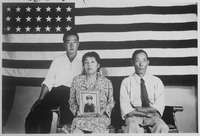Kooskia Internment Camp

during World War II

The Kooskia Internment Camp is a former internment camp in the northwest United States, located in north central Idaho, about 30 miles (50 km) northeast of Kooskia (pronounced kōō′·skē) in northern Idaho County. It operated during the final two years of World War II.[1][2]
Originally a remote highway work camp (F-38) of the Civilian Conservation Corps in 1933,[3][4][5][6] it became Federal Prison Camp No. 11 in 1935, run by the Federal Bureau of Prisons.[7][8][4][9][10] It was converted in 1943 to house interned Japanese men, most of whom were longtime U.S. residents, but not citizens, branded "enemy aliens."[1][11] So remote was the camp in the western Bitterroot Mountains, fences and guard towers were unnecessary.[1] It was run by the Immigration and Naturalization Service of the U.S. Department of Justice.[12]
A current archaeological project of the University of Idaho in Moscow,[13][14] the site is 6 miles (10 km) northeast of Lowell on U.S. 12, on the north bank of the Lochsa River[15][16] at an approximate elevation of 1,600 feet (490 m) above sea level. The two-lane federal highway[17] was completed in 1962, connecting to Montana at Lolo Pass at 5,233 feet (1,595 m) and eastward to Missoula.[18][19]
References

- 1 2 3 Erb, Tish (September 26, 1943). "Jap internees work hard, well treated, at Kooskia road camp". Lewiston Morning Tribune. Idaho. p. 1-section 2.
- ↑ Washington (May 11, 1943). "250 Japs start road jobs soon". Spokane Daily Chronicle. Washington. p. 3.
- ↑ "Fawn saved from rapids by C.C.C. men". Schenectady Gazette. New York. (Special). September 5, 1933. p. 3.
- 1 2 "Kooskia Internment Camp Archaeological Project". University of Idaho. Retrieved November 20, 2015.
- ↑ "4,261 now total". Lewiston Morning Tribune. Idaho. July 3, 1933. p. 3.
- ↑ "Sell goods fast". Lewiston Morning Tribune. Idaho. July 4, 1933. p. 2.
- ↑ "Prison labor camps to rise". Spokesman-Review. Spokane, Washington. Associated Press. August 18, 1935. p. 12.
- ↑ "It's the sane view of prison labor". Spokane Daily Chronicle. Washington. (editorial). September 7, 1935. p. 4.
- ↑ "Costs go higher at prison camp". Spokane Daily Chronicle. Washington. Associated Press. February 16, 1942. p. 6.
- ↑ "Priscilla Wegars". Idaho Humanities Council. Retrieved September 18, 2015.
- ↑ Wegars, Priscilla. "Kooskia," Densho Encyclopedia (accessed 28 Apr 2014).
- ↑ Emert, Donna (February 14, 2011). "Imprisoned in Paradise: Digging into Kooskia's Past Unearths a Timeless Lesson". University of Idaho. UI News. Retrieved July 28, 2013.
- ↑ Wegars, Priscilla. "Asian American Comparative Collection: The Kooskia Internment Camp Project". University of Idaho. Retrieved July 27, 2013.
- ↑ "Kooskia Internment Camp Scrapbook". University of Idaho. Retrieved July 27, 2013.
- ↑ Geranios, Nicholas K. (July 27, 2013). "Researchers uncover little-known internment camp". Yahoo! News. Associated Press. Retrieved July 27, 2013.
- ↑ Banse, Tom (August 5, 2010). "Archaeologists resurrect nearly forgotten WWII internment camp". Oregon Public Broadcasting. Retrieved July 27, 2013.
- ↑ Forbes, Bob (November 29, 1953). "Hiking the Wash-ho-tana link in Lochsa wilds". Spokesman-Review. Spokane, Washington. (Empire Magazine). p. 9.
- ↑ "Leaders arrive for L-C Highway dedication". Lewiston Morning Tribune. Idaho. August 19, 1962. p. 1.
- ↑ Campbell, Thomas W. (August 20, 1962). "Thousands witness L-C Highway dedication". Lewiston Morning Tribune. Idaho. p. 1.
Coordinates: 46°12′36″N 115°32′35″W / 46.21°N 115.543°W
